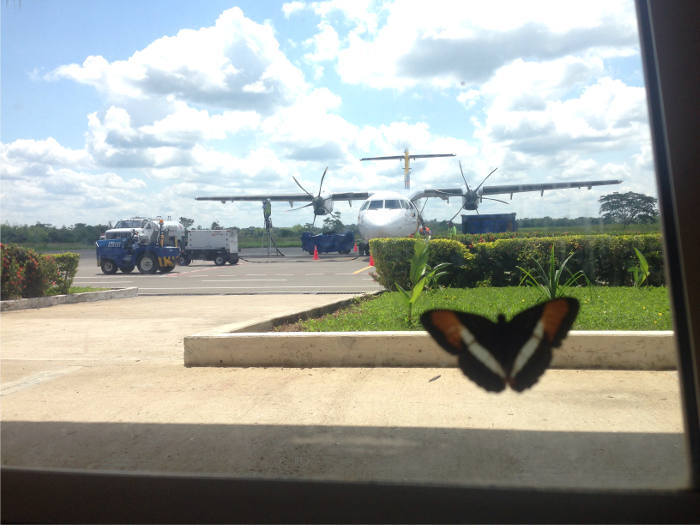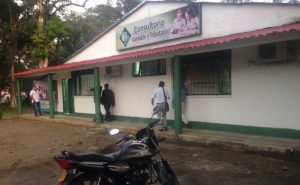-
22 February 2018
Category : Opinion
Taxation, the state and the public in the labyrinth of the post-conflict (I)
We travel to Caquetá (Colombia) with the EU-funded EUROsociAL+ programme. In this first instalment, we find out about the tax culture in one of the territories that has existed for decades on the margins of the state, engulfed in the armed conflict
 Arrival in Caquetá (Colombia)
Arrival in Caquetá (Colombia)Our twin-engine plane touches down in Florencia, capital of Caquetá Department, the gateway to the Colombian Amazon. The storm which preceded our arrival has left the evening bright and clean. The sun melts onto the strikingly beautiful emerald green landscape. Zebu cattle surrounded by white herons, meandering rivers, rice, plantain and cassava plantations, farmers finishing off their working day… A haven of peace and harmony in a land stricken by armed conflict, drug trafficking and poverty.
Caquetá, land of informality
Caquetá lives primarily from livestock and agricultural production. Its 480,000 inhabitants are distributed among 16 municipalities, although the majority of caqueteños live in Florencia, a young city, founded in 1902.
Life in Florencia takes place in the shadow of the underground economy. According to figures by the Bank of the Republic of Colombia, 76 per cent of the working population are informal workers. The weak presence of the State, low quality public services and corruption are fed by deep-rooted practices among citizens, such as tax fraud, violence and a failure to respect public property. The city’s social problems have been accentuated by a massive influx of people displaced by the armed conflict, who account for 60% of the population.

Guayas river “Why pay if they steal it, what is the State giving us? I pay taxes while others thrive by not paying them. It’s not fair”, complain business owners. “There are rich livestock owners who don’t fulfil their tax obligations out of pure selfishness, this way, public services are never going to improve”, one public official told us.
Caquetá Department, just like other areas of the Colombian post-conflict, is caught in a vicious circle that complicates the social contract and the construction of a new framework for coexistence. The reciprocity between the State and citizens and trust between individuals is complicated.
The difficult task of collecting taxes
Being a public official in Caquetá is a challenge, but being a tax collector there deserves a medal. Someone who is only too aware of this is Hernando Vásquez. Hernando came up through the ranks to become the District Director of the Colombian Directorate of National Taxes and Customs (DIAN) in Caquetá: “Many years ago, when I first began working in the tax administration, I was the only auditor in the whole of Caquetá and I noticed real resistance from business owners and taxpayers. I conducted censuses and at times, I feared for my life, I almost had to run away”.
One result of the absence of the State in much of the region was that in many places, people paid a ‘vaccine’, a tax that citizens were made to pay by FARC (Revolutionary Armed Forces of Colombia). Business owners were forced to keep two sets of books in order to pay the extortion, keep their business, and most importantly, keep their family safe. Extortion by paramilitaries was also common.
Sometimes, business owners used armed groups to avoid paying taxes to the State. Hernando tells us that the inhabitants of one town told FARC about the presence of DIAN auditors. Faced with an incursion by guerilla fighters, the public officials had to leave the town in order to save their lives
Carrots and sticks
Although times have changed since the peace agreements between the Government and the armed groups, collecting taxes in this region of Colombia is still complicated, and paying them is not a priority civic duty in the minds of most caqueteños.
The State and DIAN are viewed with suspicion. There is a general lack of awareness about taxation. Many people are forced to work in the underground economy. Those that are aware of their obligations and have the financial means do not pay due to a lack of solidarity. Criminal gangs that benefited from contraband and extortion are still a threat for traders and business owners and of course, DIAN officials.
For taxes to be key in building peace and a more equal society with better public services, it is essential to transform the tax culture of the population and cause a paradigm shift in the relationship between the tax collector and the public.
Álvaro Pacheco, the Governor of Caquetá, is conscious of the need for more reciprocity: “As public awareness increases, so does tax revenue, and we see this reflected in projects that our country really needs, meaning we can advance forwards Paying taxes is nothing to be afraid of”.

One of the tax advice centres The DIAN in Caquetá knows that coercion will not get it anywhere, what it needs to do is convince. With only ten auditors, there is no way it can be breathing down every taxpayer’s neck. It needs to build bridges. As well as sticks, it needs carrots.
The tax incentives created to promote formalisation and investment must therefore be accompanied by better tax information and assistance for citizens, as well as a good dose of education on the social purpose of taxes and public spending. Teaching children about taxes from an early age can make this process sustainable, and in the long-term contribute to voluntary compliance with tax obligations.
For several years, DIAN has been promoting meetings with children and young people about tax culture in schools in Caquetá, and it holds tax services events to raise awareness of its role and get closer to the public. New opportunities are arising to consolidate and multiply these efforts through universities in the form of the Tax Assistance Hub project (NAF in its Spanish acronym).
Borja Díaz Rivillas, Senior Expert in Democratic Governance for the EUROsociAL+ Programme.
The views and opinions expressed in this blog are the sole responsibility of the person who write them.




